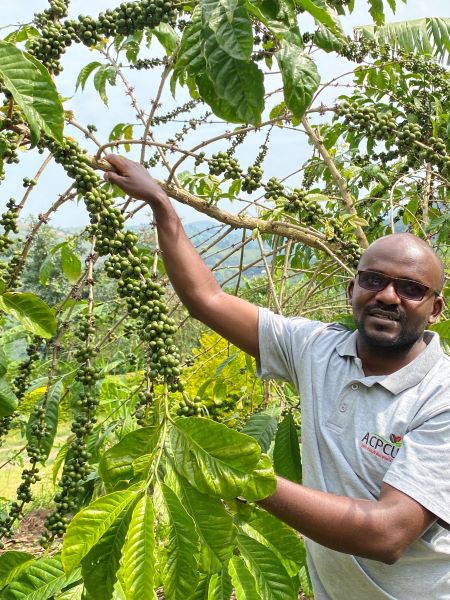The African Plant Nutrition Institute (APNI), along with OCP-Foundation, both of Morocco, launched the project “Green Carbon, Livelihoods and Resilience in Ugandan Smallholder Coffee Systems”. The project relies on the active involvement of several partners such as Makerere University College of Agricultural and Environmental Sciences (CAES), Ankole Coffee Producers Co-operative Union Limited – ACPCU Ltd., National Agricultural Research Organization in Uganda – NARO, Mohammed VI Polytechnic University in Morocco – UM6P, international NGO Producers Direct, and the Environmental Conservation Trust of Uganda – Ecotrust.
Between the 1st and the 4th of February 2023, researchers and practitioners from the partner institutions met in Kampala and Mbarara, Uganda, to deliberate on the project’s implementation and to share experiences on best practices in line with the project.
Key objectives of the project include increasing and then monetizing above-ground carbon in Robusta coffee (led by Ecotrust); farmer-led experimentation for improved coffee yield and quality (led by Producers Direct and APNI); market-responsive diversification of Robusta coffee systems (led by Producers Direct); and researching the potential for additional carbon credits created through adequate soil management practices (research jointly implemented by APNI, UM6P, and CAES of Makerere University).
The overarching goal of the project is to increase the incomes of ACPCU Ltd. farmers. The workshop, therefore, created a common vision, set expectations, and identified ways of aligning the project with ACPCU Ltd. objectives. ACPCU Ltd., headquartered in the Sheema Municipality, Uganda, is a Fair-Trade and Organic certified coffee processing and exporter organization that will host the project’s field activities. ACPCU Ltd. has grown from 10 co-operative societies to 26 in a period of just 15 years. The farmer-owned export coffee co-operative union has over 15,000 members from distinct, multi-ethnic communities living across the mountains of southwestern Uganda.
The participating institutions are hopeful that the project will lead to improved knowledge along the coffee value chain, address challenges related to climate change, and improve the production of not only farmers under ACPCU Ltd. but in the whole country – through the engagement of NARO. The project will also support graduate student research in the sector.
Perspectives that were shared by some project partners during the meeting point to a broad range of positive impacts that target coffee farmers within the region:
“The project comes at a time when coffee production is stressed with issues of climate change and its farmers are in strong need of adaptation strategies. This new project has a component on tree planting, and this will largely support our efforts to avert the effects of climate change. It is also important because it focuses on diversifying incomes of farmers in a way that conserves the environment.” ¾ Bamuhangaine Nicodemus, ACPCU Ltd.
“Our project is designed to support farmers’ aspirations for their farms and to address the different shocks they often experience along the coffee value chain. It will also improve productivity, the quality of products, and farmers’ revenue. Each partner brings their unique experience on board which creates a special degree of synergy.” ¾ Dr. Kaushik Majumdar, Director General APNI.
“This project will strengthen collaboration among farmers leading to improved markets and better agricultural practices. It will also accelerate the diversification of opportunities to strengthen the coffee system, and new agriculture systems that will increase revenues of the farmers resulting in improved livelihoods. With the project, Uganda will become an inspiring model for many other countries.” ¾ Ms. Hassina Moukhariq, International Portfolio Lead at OCP Foundation.
“Our work will help generate data to inform decision making and partnerships across the coffee value chain. It will also build a critical mass of people with better understanding of how best we can innovate to increase income for farmers.” ¾ Dr. Ngonidzashe Chirinda, Professor of Sustainable Tropical Agriculture, UM6P.








